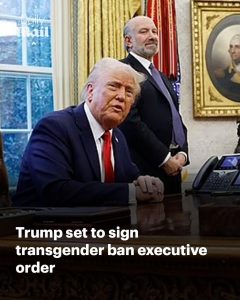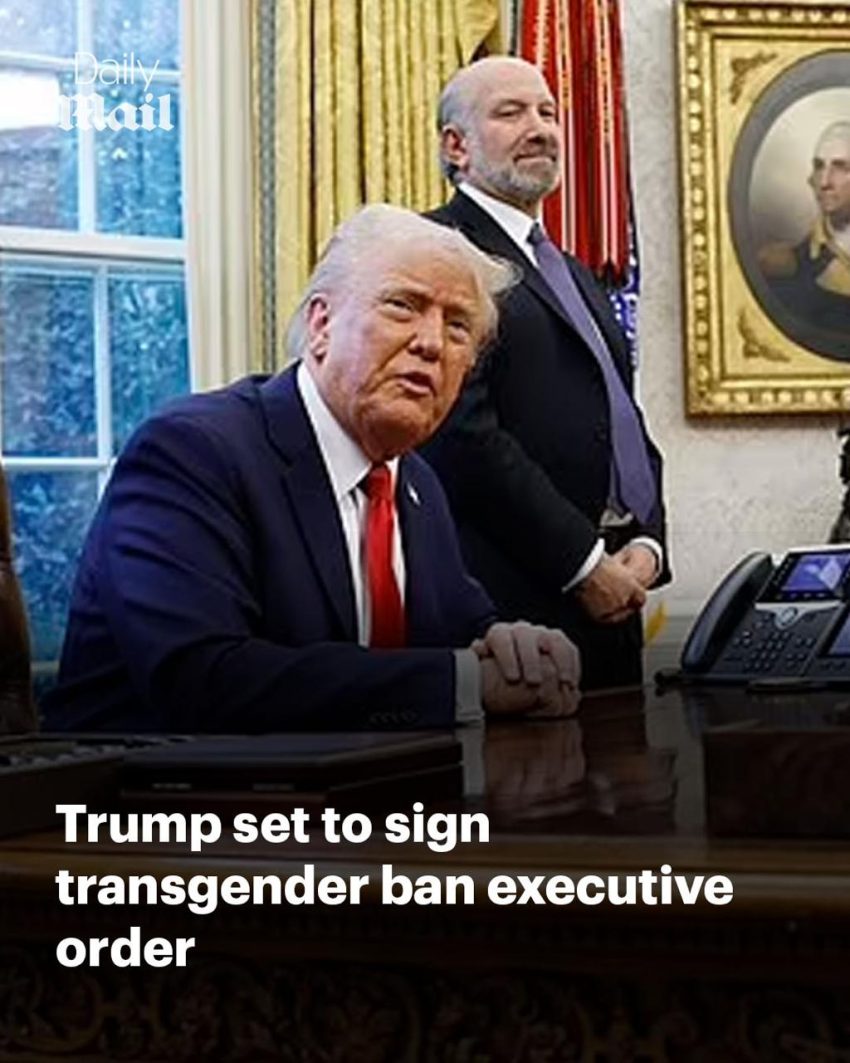President Donald Trump will issue an executive order on Wednesday that will forbid men from playing women’s sports, marking a major stride in his political goal. This action was taken in response to worries regarding transgender athletes participating in women’s sports and was a major part of Trump’s 2024 presidential campaign. Many of Trump’s supporters have found resonance in his position, especially those who think that biological men shouldn’t compete against women in sports.
Trump regularly compared himself to his political rivals, especially Vice President Kamala Harris, by bringing up the topic of transgender rights during his campaign. His comments regarding transgender rights and sports have been exploited to galvanise his supporters and take advantage of doubts regarding the equity of permitting transgender women to participate in women’s sports. These worries, which have been expressed by numerous college students, their parents, and even some well-known individuals in the sports industry, are directly addressed by this executive order.

Citing the physical distinctions between biological men and women, many opponents of transgender women in women’s sports contend that it gives them an unfair edge. One commonly made claim is that transgender women who were assigned male at birth might still have physical advantages including endurance, muscle mass, and bone density, which could help them outperform other female athletes in competition. These worries have been most noticeable in collegiate sports, where transgender athletes have reportedly been denied opportunities and medals, according to female players and their families.
About 900 medals in women’s sports have reportedly been won by biological males, according to a United Nations report from the previous year. The research claims that over 600 female competitors have lost over 890 medals in 29 different sports in more than 400 competitions. According to Special Rapporteur on the Rights of Women and Girls Reem Alsalem, “a growing number of female athletes are losing opportunities, including medals, when competing against males as a result of the replacement of the female sports category with a mixed-sex category.”
Since swimmer Lia Thomas became the first transgender athlete to win an NCAA Division 1 championship in 2022, there has been a greater focus on this subject. Thomas’s win generated a lot of discussion and controversy, with many contending that it brought attention to the difficulties in preserving fair competition in women’s sports as more transgender athletes entered prominent tournaments.
By extending Title IX, a 1972 legislation that forbids sex-based discrimination in education, to include safeguards against discrimination based on gender identity and sexual orientation, the Biden administration has adopted a different strategy in an effort to improve rights for LGBTQ+ students. The government wanted to make sure transgender athletes could play sports that matched their gender identity.
Trump and other Republicans, however, have denounced this extension of Title IX as a loophole that would undermine opportunities for biological females by permitting transgender individuals to participate in women’s sports. In order to make it clear that protections against discrimination would apply in other areas of education but not necessarily in sporting events, the White House has maintained that the extended Title IX regulation did not apply to sports.
Following legal complaints from other states, a federal judge rejected the Biden administration’s change to the law last month, marking a significant legal shift in the dispute over Title IX. Many anticipate further legal disputes to follow, and this decision has sparked concerns about the future of transgender athletes in competitive sports.
Trump has a lengthy history of issuing executive orders on gender identity-related matters, and his administration has made it plain that transgender rights should be limited in federal policies. When Trump took office in 2017, he signed an executive order declaring that the federal government would only recognise two genders: male and female. The goal of this directive was to repeal the Obama administration’s regulations that protected transgender people.
The Biden administration created the “X” designation to give nonbinary, intersex, or gender nonconforming people an alternative to male or female, but Trump also signed an order banning the use of gender-neutral symbols in passport applications. The Trump administration also demanded that federal activities supporting what it dubbed “gender ideology” halt, and it cancelled several diversity and equality programs.
Trump also signed an executive order that limited access to hormone treatments and procedures for transgender youth and gender-affirming care for those under the age of 19. With a focus on removing federal funding for such procedures, the secretary of health and human services was directed to “take all appropriate actions to end the chemical and surgical mutilation of children.”
Like his most recent executive order, these directions are likely to be challenged in court, and many believe that the courts will eventually determine how Trump’s gender-related policies turn out.
Given that Wednesday is the 39th annual National Girls & Women in Sports Day, a day honouring the achievements of women in sports, the timing of this executive order is noteworthy. By showcasing their contributions to athletic success and gender parity in sports, this event highlights the significance of athletics in empowering women and girls.
Trump’s executive order is anticipated to spark strong opposition from LGBTQ+ rights advocates, athletes, and organisations that feel it is essential to guarantee transgender athletes the right to compete in sports in accordance with their gender identity, even though it is also likely to receive strong support from his base and those worried about the fairness of women’s sports.
With possible ramifications for future legislative and judicial disputes pertaining to gender and sports, the debate surrounding transgender players in women’s sports is anticipated to continue influencing the national dialogue as Trump gets ready to sign the executive order.
